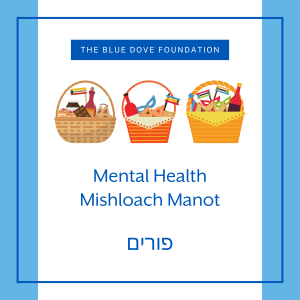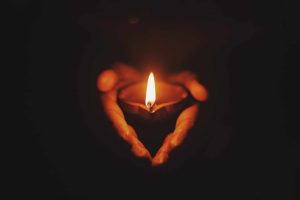
Searching in Our Souls: A Pre-Bedikat Chametz Meditation
Jews around the world spent the night before Passover searching their homes for any chametz, such as bread and other items not Kosher for Passover, that they may have missed, before burning or disposing of that chametz the morning before the holiday begins. This process is called “Bedikat Chametz,” or searching for Chametz. Now, as you prepare to search for the chametz in your homes, let’s take a moment to meditate on the chametz in our souls that we will be releasing tomorrow when we burn that chametz, to experience the personal redemption of Passover.

Your Red Sea, Your Pursuers, and Your Nachshon Moment
By Ruthie Hollander | We can’t find freedom by outrunning anxiety, anger, or grief. This lesson is captured in the compiled Rabbinic teachings called midrash, which preserves the memory of Nachshon, prince of the tribe of Judah and brother-in-law of Aaron. The sea only splits, according to the midrash, when Nachshon steps forward and enters the sea, “since they (b’nai Yisrael) were standing and taking advice/debating/arguing (over what course of action they should take).” Their salvation came at the hand of a brave man’s choice to step forward. What is your Nachshon Moment?

Substances and Sleep: How Alcohol, Prescription Drugs, and Stimulants Disrupt Your Sleep
From NCOA – the National Counsel on Aging: Understanding how substances like alcohol, prescription and over-the counter drugs, and stimulants, affect your sleep can help you discover ways for a more restful night’s sleep.

Quieting the Silence with the Jewish Federation of Greater Atlanta, Hamsa, JF&CS, and Jeff’s Place
#QuietingTheSilence is a platform that creates a space for members of the community to come together and share their lived experience with mental illness and addiction. We are excited to host this program in partnership with JF&CS Atlanta, HAMSA, Jeff’s Place at Chabad Intown and The Blue Dove Foundation.

Mental Health Mishloach Manot
By Max Hollander | We don’t only preserve community by taking care of our most unfortunate community members when they need us; we do so by also showing the people in our lives we care about them even when they don’t need us. We can’t just ensure the poorest among us don’t fall through the cracks; we must also strive to ensure those closest to us don’t drift away. This balance between matanot l’evyonim (gifts to the poor) and mishloach manot (gifts to our friends) is what nurtures community, and community is what nurtures us in the aftermath of intense challenges and trauma.

Jewish Responses to Traumatic Death with the Shomer Collective
What can we possibly say to a person who is grieving a traumatic death? We know too many examples of such events in our own lives, from the shock of death by suicide, to the realities of death by natural disaster, to the horror of death by terrorism, and more. And yet, too often, we are stunned into our own silence, and moreso, into our own inaction, not knowing what to say or do in response to a traumatic death in our communities.
